Erica Verrillo's Blog, page 89
September 24, 2014
Writers of the Future Contest - For Sci-fi Writers (No Entry Fee)
 If you are a sci-fi or fantasy writer, this is a great contest to enter. It's free, and the prizes are substantial.
If you are a sci-fi or fantasy writer, this is a great contest to enter. It's free, and the prizes are substantial. This is a contest for amateur writers only. (See rules below.) So, if you have published a book, or more than three stories in professional publications (at professional rates), you are not eligible.
You can submit an unpublished sci-fi short story or novella (up to 17,000 words). The contest is held four times a year, so there are ample chances to win.
______________________
From the website:
L. Ron Hubbard’s Writers of the Future Contest is an opportunity for new and amateur writers of new short stories or novelettes of science fiction or fantasy. No entry fee is required. Entrants retain all publication rights. All awards are adjudicated by professional writers only. Prizes every three months: $1,000, $750, $500, Annual Grand Prize: $5,000 additional!
Rules
1. No entry fee is required, and all rights in the story remain the property of the author. All types of science fiction, fantasy and dark fantasy are welcome.
2. By submitting to the Contest, the entrant agrees to abide by all Contest rules.
3. All entries must be original works, in English. Plagiarism, which includes the use of third-party poetry, song lyrics, characters or another person’s universe, without written permission, will result in disqualification. Excessive violence or sex, determined by the judges, will result in disqualification. Entries may not have been previously published in professional media.
4. To be eligible, entries must be works of prose, up to 17,000 words in length. We regret we cannot consider poetry, or works intended for children.
5. The Contest is open only to those who have not professionally published a novel or short novel, or more than one novelette, or more than three short stories, in any medium. Professional publication is deemed to be payment of at least six cents per word, and at least 5,000 copies, or 5,000 hits.
6. Entries submitted in hard copy must be typewritten or a computer printout in black ink on white paper, printed only on the front of the paper, double-spaced, with numbered pages. All other formats will be disqualified. Each entry must have a cover page with the title of the work, the author’s legal name, a pen name if applicable, address, telephone number, e-mail address and an approximate word count. Every subsequent page must carry the title and a page number, but the author’s name must be deleted to facilitate fair, anonymous judging.
Entries submitted electronically must be double-spaced and must include the title and page number on each page, but not the author’s name. Electronic submissions will separately include the author’s legal name, pen name if applicable, address, telephone number, e-mail address and approximate word count.
7. Manuscripts will be returned after judging only if the author has provided return postage on a self-addressed envelope.
8. We accept only entries that do not require a delivery signature for us to receive them.
9. There shall be three cash prizes in each quarter: a First Prize of $1,000, a Second Prize of $750, and a Third Prize of $500, in US dollars. In addition, at the end of the year the winners will have their entries rejudged, and a Grand Prize winner shall be determined and receive an additional $5,000. All winners will also receive trophies.
10. The Contest has four quarters, beginning on October 1, January 1, April 1 and July 1. The year will end on September 30. To be eligible for judging in its quarter, an entry must be postmarked or received electronically no later than midnight on the last day of the quarter. Late entries will be included in the following quarter and the Contest Administration will so notify the entrant.
11. Each entrant may submit only one manuscript per quarter. Winners are ineligible to make further entries in the Contest.
12. All entries for each quarter are final. No revisions are accepted.
13. Entries will be judged by professional authors. The decisions of the judges are entirely their own, and are final.
14. Winners in each quarter will be individually notified of the results by phone, mail or e-mail.
15. This Contest is void where prohibited by law.
Published on September 24, 2014 08:17
September 23, 2014
Amazon Opens Its Doors to Self-Publishers of Children's Books
 Even as half of Europe is sharpening their spears in preparation for a protracted war on Amazon, the self-publishing giant has made it even easier to publish books for children.
Even as half of Europe is sharpening their spears in preparation for a protracted war on Amazon, the self-publishing giant has made it even easier to publish books for children.The main sticking point of uploading children’s books onto Amazon’s platform has been the difficulty of getting illustrations to convert to Kindle. Amazon appears to have solved that problem with KDP Kids, a publishing platform that allows authors to import illustrations, add pop-ups, and preview illustrated books with Kindle Kids' Book Creator.
More to the point, KDP Kids allows authors to target the parents - the people who are going to buy your book - of children in their demographic.
_____
Amazon Unveils KDP Kids
Source: Publishers Weekly, Sep 04, 2014
In a move designed to attract and support children’s book authors and self-publishers, Amazon has launched KDP Kids, a children's-focused illustrated and chapter book category in the Kindle Store.
Amazon is also introducing the Kindle Kids’ Book Creator, a set of authoring tools designed to facilitate the creation and production of kids’ digital titles for the Kindle format, including illustrated titles. Commenting on the launch and ability to create illustrated books, Kindle senior v-p Russ Grandinetti said, “No one should have to be a computer programmer to create a beautiful, illustrated book for kids."
The move marks the continuing growth of digital self-publishing in general as well as the growing number of children’s books already available via KDP. Under the new KDP Kids category, authors will also have access to the Kindle Kids Book Creator, which offers software tools (available for Windows and Mac OS) that can take advantage of Kindle format features like pop-up text, previews and the importation of illustrations.
KDP Kids authors can prepare their prose or illustrated books, upload them to KDP Kids and use a variety of filters for age, grade and reading levels to place the title and attract the specific customer leveled for their titles. Through the KDP Kids platform, authors can earn up to a 70% royalty depending upon book price.
KDP Kids authors will also have access to Kindle Marketing tools such as Countdown Deals and Free Book promotions. They are also eligible to enroll in Kindle Unlimited, Amazon’s e-book subscription service, and the Kindle Lending Library.
Published on September 23, 2014 10:14
September 13, 2014
2 New Agents with Established Agencies Looking for Clients
Here are two new agents looking to build their client lists. Genevieve Nine's agency, Andrea Hurst, is well regarded in the industry. Valerie Noble works for one of the few Canadian agencies.
I am a fan of new agents. They are hard-working, enthusiastic, and energetic. And they love their clients. These are essential qualities for pitching to an editor. (Click on the agent's name and agency to learn more.)
___________________
 Genevieve Nine of Andrea Hurst & Associates
Genevieve Nine of Andrea Hurst & Associates
About Genevieve Nine: Genevieve joined Andrea Hurst Literary Management as an intern in 2012. She has a background in professional editing and gets great satisfaction from developing authors. She’s a Creative Writing MFA candidate at the Northwest Institute of Literary Arts, holds a Certificate in Children’s Writing from the University of Washington, and graduated with honors and a B.A. from the USC School of Cinema & Television. When not reading or writing, Genevieve enjoys watching her Sherlock DVDs, planning future travels, and embarking on culinary adventures. She and her husband live in Seattle with their two naughty cats, Selkie and Napoleon. Follow Genevieve on Twitter @GenevieveNine.
What she is looking for: Within young adult and middle grade, she’s looking to acquire:
Fantasy (open to all subgenres except game-related) Science Fiction Mystery Historical Fiction Retellings (classics, fairy/folk tale, myth) Contemporary Realism (especially with elements of humor)She also represents the following adult and new adult categories:
Mystery (detective/PI, amateur, cozy, historical, comic, caper)
Thriller (supernatural, historical, disaster, ecological)
Gothic/Hauntings/Quiet Horror
Historical Fiction
Retellings (classics, fairy/folk tale, myth)
Romantic Comedy
Magical Realism
Food Memoir
Travelogue/Travel Memoir
She is not seeking:
Hard SF/Military SF/Space OperaGraphic HorrorEroticaReligious Fiction/NonfictionShort StoriesHow to submit: querygenevieve@andreahurst.com. Email queries only. ŸNo attachments. ŸInclude “Query: Book Title” in the email’s subject line. ŸPaste the first ten pages of manuscript below your query. ŸPlease state if manuscript has been previously self-published. ŸPlease state if query is a multiple submission and inform Genevieve if the project becomes no longer available for representation.
____________________
 Valerie Noble of Donaghy Literary Group
Valerie Noble of Donaghy Literary Group
About Valerie: Valerie Noble is an Associate Agent at Donaghy Literary Group. While studying chemistry at California State University, Long Beach, Valerie mastered the art of doing proper research, particularly for technical writing. Her love of science and reading merged when she began penning her first novel in the midst of her studies. In true scientific fashion, Valerie researched all there was to know about publishing. She connected with agents, editors, and other writers, and interned for Jessica Sinsheimer of Sarah Jane Freymann Literary Agency.
An education is never finished and Valerie continues to cultivate relationships and hopes to use her knowledge and skills in finding fresh new voices for Donaghy Literary Group.
What she is looking for: Valerie is seeking Young Adult, and New Adult — in the following areas:
• Science Fiction YA/NA
• Fantasy YA/NA
• Historical Fantasy YA/NA
• Historical Fiction YA/NA
Valerie loves YA/NA science fiction and fantasy (think Kristin Cashore and Suzanne Collins) but reads everything under the sun. For her, it’s more about the writing and less about the genre. In saying that, Valerie is generally not interested in romance or paranormal.
How to submit: Electronic Submissions only. Send the query letter, 1-2 page synopsis and the first 10 pages of manuscript — all in body of email, no attachments. Send to query(at)donaghyliterary(dot)com.
I am a fan of new agents. They are hard-working, enthusiastic, and energetic. And they love their clients. These are essential qualities for pitching to an editor. (Click on the agent's name and agency to learn more.)
___________________
 Genevieve Nine of Andrea Hurst & Associates
Genevieve Nine of Andrea Hurst & AssociatesAbout Genevieve Nine: Genevieve joined Andrea Hurst Literary Management as an intern in 2012. She has a background in professional editing and gets great satisfaction from developing authors. She’s a Creative Writing MFA candidate at the Northwest Institute of Literary Arts, holds a Certificate in Children’s Writing from the University of Washington, and graduated with honors and a B.A. from the USC School of Cinema & Television. When not reading or writing, Genevieve enjoys watching her Sherlock DVDs, planning future travels, and embarking on culinary adventures. She and her husband live in Seattle with their two naughty cats, Selkie and Napoleon. Follow Genevieve on Twitter @GenevieveNine.
What she is looking for: Within young adult and middle grade, she’s looking to acquire:
Fantasy (open to all subgenres except game-related) Science Fiction Mystery Historical Fiction Retellings (classics, fairy/folk tale, myth) Contemporary Realism (especially with elements of humor)She also represents the following adult and new adult categories:
Mystery (detective/PI, amateur, cozy, historical, comic, caper)
Thriller (supernatural, historical, disaster, ecological)
Gothic/Hauntings/Quiet Horror
Historical Fiction
Retellings (classics, fairy/folk tale, myth)
Romantic Comedy
Magical Realism
Food Memoir
Travelogue/Travel Memoir
She is not seeking:
Hard SF/Military SF/Space OperaGraphic HorrorEroticaReligious Fiction/NonfictionShort StoriesHow to submit: querygenevieve@andreahurst.com. Email queries only. ŸNo attachments. ŸInclude “Query: Book Title” in the email’s subject line. ŸPaste the first ten pages of manuscript below your query. ŸPlease state if manuscript has been previously self-published. ŸPlease state if query is a multiple submission and inform Genevieve if the project becomes no longer available for representation.
____________________
 Valerie Noble of Donaghy Literary Group
Valerie Noble of Donaghy Literary GroupAbout Valerie: Valerie Noble is an Associate Agent at Donaghy Literary Group. While studying chemistry at California State University, Long Beach, Valerie mastered the art of doing proper research, particularly for technical writing. Her love of science and reading merged when she began penning her first novel in the midst of her studies. In true scientific fashion, Valerie researched all there was to know about publishing. She connected with agents, editors, and other writers, and interned for Jessica Sinsheimer of Sarah Jane Freymann Literary Agency.
An education is never finished and Valerie continues to cultivate relationships and hopes to use her knowledge and skills in finding fresh new voices for Donaghy Literary Group.
What she is looking for: Valerie is seeking Young Adult, and New Adult — in the following areas:
• Science Fiction YA/NA
• Fantasy YA/NA
• Historical Fantasy YA/NA
• Historical Fiction YA/NA
Valerie loves YA/NA science fiction and fantasy (think Kristin Cashore and Suzanne Collins) but reads everything under the sun. For her, it’s more about the writing and less about the genre. In saying that, Valerie is generally not interested in romance or paranormal.
How to submit: Electronic Submissions only. Send the query letter, 1-2 page synopsis and the first 10 pages of manuscript — all in body of email, no attachments. Send to query(at)donaghyliterary(dot)com.
Published on September 13, 2014 07:34
September 10, 2014
10 Bestsellers That Began as Self-Published Books
There is much to be said for self-publishing, especially if you have spent a year or ten (see Michael J. Sullivan below) trying to get publishing houses interested in your work. If you self-publish, and do a proper job of marketing, your book may not only achieve success in its own right, but may be picked up by a major publishing house. (Ironically, it may even be published by one of the houses that has previously sent you a rejection slip.)
All of these books have one thing in common - their authors did not simply publish and then lean back and enjoy their success. They marketed, pitched, and sold the heck out of their books. And they continued to write.
Here are a few best-sellers whose authors did not give up on them.
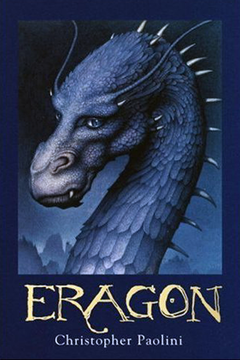 Eragon is a young adult fantasy series written by Christopher Paolini, who began writing it at the age of 15. Paolini's parents published the book (they owned a small press), after which Paolini spent a year traveling around the United States promoting his novel. The book was discovered by Carl Hiaasen, who got it re-published by Alfred A. Knopf. The re-published version was released on August 26, 2003.
Eragon is a young adult fantasy series written by Christopher Paolini, who began writing it at the age of 15. Paolini's parents published the book (they owned a small press), after which Paolini spent a year traveling around the United States promoting his novel. The book was discovered by Carl Hiaasen, who got it re-published by Alfred A. Knopf. The re-published version was released on August 26, 2003.
___________________________
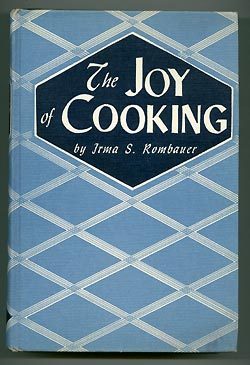 What American household does not have a copy of The Joy of Cooking in its kitchen? The Joy of Cooking was privately published in 1931 by Irma S. Rombauer, a homemaker in St. Louis, Missouri. Initially, Rombauer had 3,000 copies printed by A.C. Clayton, a company which had printed labels for St. Louis shoe companies and for Listerine, but never a book. In 1936, the book was picked up by a commercial printing house, the Bobbs-Merrill Company. Since then, over 18 million copies have been sold.
What American household does not have a copy of The Joy of Cooking in its kitchen? The Joy of Cooking was privately published in 1931 by Irma S. Rombauer, a homemaker in St. Louis, Missouri. Initially, Rombauer had 3,000 copies printed by A.C. Clayton, a company which had printed labels for St. Louis shoe companies and for Listerine, but never a book. In 1936, the book was picked up by a commercial printing house, the Bobbs-Merrill Company. Since then, over 18 million copies have been sold.
_________________________
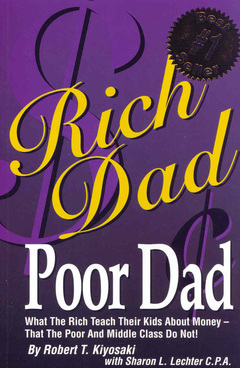 Rich Dad Poor Dad is a financial advice book written by American businessman, author and investor Robert Kiyosaki. In keeping with Kiyosaki's ideas that ownership of high value assets that produce cash flow is the key to wealth, rather than being an employee, he self-published the book in 1997. In spite of containing "much wrong advice, much bad advice, some dangerous advice, and virtually no good advice" (John T. Reed) Rich Dad Poor Dad has sold over 26 million copies.
Rich Dad Poor Dad is a financial advice book written by American businessman, author and investor Robert Kiyosaki. In keeping with Kiyosaki's ideas that ownership of high value assets that produce cash flow is the key to wealth, rather than being an employee, he self-published the book in 1997. In spite of containing "much wrong advice, much bad advice, some dangerous advice, and virtually no good advice" (John T. Reed) Rich Dad Poor Dad has sold over 26 million copies.
__________________________
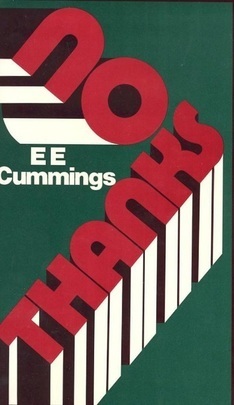 No Thanks is a 1935 collection of poetry by one of America's most famous poets, e.e. cummings. After being rejected by publishers, Cummings self-published the collection with the help of his mother. With typical panache, the poet dedicated the aptly titled No Thanks to the fourteen publishing houses which had turned the collection down. Forsaking printing conventions - as well as those who employ them - No Thanks is bound at the top, like a stenographer's pad, rather than on the left. The volume was later published by W.W. Norton and Company.
No Thanks is a 1935 collection of poetry by one of America's most famous poets, e.e. cummings. After being rejected by publishers, Cummings self-published the collection with the help of his mother. With typical panache, the poet dedicated the aptly titled No Thanks to the fourteen publishing houses which had turned the collection down. Forsaking printing conventions - as well as those who employ them - No Thanks is bound at the top, like a stenographer's pad, rather than on the left. The volume was later published by W.W. Norton and Company.
____________________
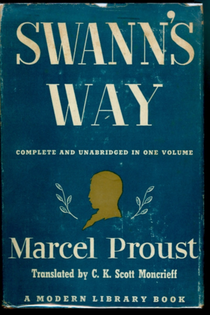 Marcel Proust's epic novel Remembrance of Times Past (A la Recherche du Temps Perdu) has been called "the most respected novel of the twentieth century." Proust began writing what ultimately became seven novels in 1909. As is so often the case with anything unconventional, the work was repeatedly rejected by publishing houses. In one particularly devastating rejection, Alfred Humbolt, head of Ollendorf Publishing Company, wrote: "I may be as thick as two planks but I can’t understand how a gentleman can take thirty pages to describe how he tosses and turns in his bed before going off to sleep." Rather than give up, Proust paid the Grasset Publishing House for the publication of the first volume, Swann's Way. Since its original print run of 1000, millions of copies have been sold. Keeping up with the times (no pun intended), Remembrance of Times Past was turned into a comic book in 1998. Unlike the original novel, the graphic novel had no problem finding a publisher. (NYT)
Marcel Proust's epic novel Remembrance of Times Past (A la Recherche du Temps Perdu) has been called "the most respected novel of the twentieth century." Proust began writing what ultimately became seven novels in 1909. As is so often the case with anything unconventional, the work was repeatedly rejected by publishing houses. In one particularly devastating rejection, Alfred Humbolt, head of Ollendorf Publishing Company, wrote: "I may be as thick as two planks but I can’t understand how a gentleman can take thirty pages to describe how he tosses and turns in his bed before going off to sleep." Rather than give up, Proust paid the Grasset Publishing House for the publication of the first volume, Swann's Way. Since its original print run of 1000, millions of copies have been sold. Keeping up with the times (no pun intended), Remembrance of Times Past was turned into a comic book in 1998. Unlike the original novel, the graphic novel had no problem finding a publisher. (NYT)
__________________________
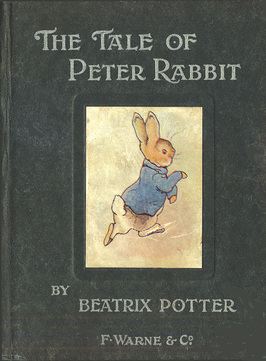 One of the most beloved children's books of all time, The Tale of Peter Rabbit, was originally self-published by Beatrix Potter in 1901. After receiving rejection letters from publishers for a story she had made up to entertain a sick boy, Potter, a 35-year-old writer and illustrator, took matters into her own hands and printed 250 copies of the book. Within a year, it was picked up by one of the publishers that had turned it down, F. Warne & Co, which almost immediately sold 20,000 copies. However, Potter's adventure with self-publishing did not stop there. When Warne insisted on cutting parts of the Tailor of Gloucester, Potter turned around and printed 500 copies herself. Over two million Beatrix Potter books are sold each year.
One of the most beloved children's books of all time, The Tale of Peter Rabbit, was originally self-published by Beatrix Potter in 1901. After receiving rejection letters from publishers for a story she had made up to entertain a sick boy, Potter, a 35-year-old writer and illustrator, took matters into her own hands and printed 250 copies of the book. Within a year, it was picked up by one of the publishers that had turned it down, F. Warne & Co, which almost immediately sold 20,000 copies. However, Potter's adventure with self-publishing did not stop there. When Warne insisted on cutting parts of the Tailor of Gloucester, Potter turned around and printed 500 copies herself. Over two million Beatrix Potter books are sold each year.
____________________
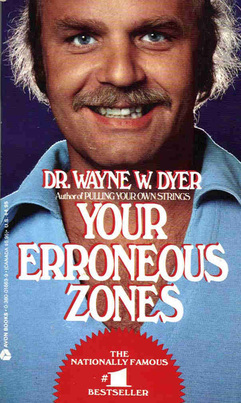 Wayne Dyer originally self-published his self-help book, Your Erroneous Zones, with a print run of 4,500 copies. He then spent the next year traveling across the country, publicizing his book on TV shows. (You could still do that in the 1970s.) It eventually became one of the top-selling books of all time, with an estimated 35 million copies sold. The book spent 64 weeks on the New York Times bestseller list.
Wayne Dyer originally self-published his self-help book, Your Erroneous Zones, with a print run of 4,500 copies. He then spent the next year traveling across the country, publicizing his book on TV shows. (You could still do that in the 1970s.) It eventually became one of the top-selling books of all time, with an estimated 35 million copies sold. The book spent 64 weeks on the New York Times bestseller list.
____________________
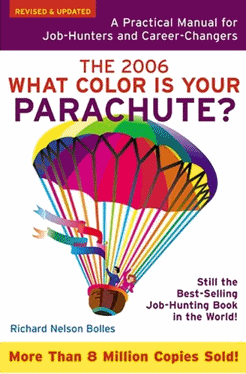 What Color Is Your Parachute?, a job-hunting guide by Richard N. Bolles, has been on the New York Times best-seller list periodically for more than a decade. Bolles self-published the book in 1970. Since then the book has seen almost yearly updates with more than 10 million copies sold. (Even I own a copy.)
What Color Is Your Parachute?, a job-hunting guide by Richard N. Bolles, has been on the New York Times best-seller list periodically for more than a decade. Bolles self-published the book in 1970. Since then the book has seen almost yearly updates with more than 10 million copies sold. (Even I own a copy.)
____________________
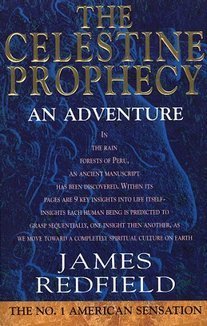 The Celestine Prophecy was self-published by James Redfield after being repeatedly rejected by publishers. He sold 100,000 copies of the novel out of the trunk of his Honda before Warner Books agreed to publish it. In spite of drawing fire for its historical absurdities (Mayas in Peru, writing in Aramaic?), the book has sold over 20 million copies worldwide.
The Celestine Prophecy was self-published by James Redfield after being repeatedly rejected by publishers. He sold 100,000 copies of the novel out of the trunk of his Honda before Warner Books agreed to publish it. In spite of drawing fire for its historical absurdities (Mayas in Peru, writing in Aramaic?), the book has sold over 20 million copies worldwide.
___________________________
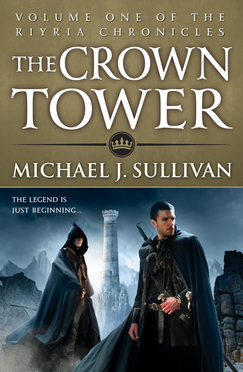 After 10 years of rejections, Michael J. Sullivan quit writing altogether. Then, one day, he sat down and wrote the Riyria Revelation fantasy series. He still couldn't find a publisher, so Sullivan self-published through Ridan Publishing, a company started by his wife. His sales were so impressive that he re-solicited mainstream publishers, and this time received several offers. The Riyria Revelations has now been translated into fourteen languages. In 2012 io9 named him one of the "Most Successful Self-Published Sci-Fi and Fantasy Authors."
After 10 years of rejections, Michael J. Sullivan quit writing altogether. Then, one day, he sat down and wrote the Riyria Revelation fantasy series. He still couldn't find a publisher, so Sullivan self-published through Ridan Publishing, a company started by his wife. His sales were so impressive that he re-solicited mainstream publishers, and this time received several offers. The Riyria Revelations has now been translated into fourteen languages. In 2012 io9 named him one of the "Most Successful Self-Published Sci-Fi and Fantasy Authors."
All of these books have one thing in common - their authors did not simply publish and then lean back and enjoy their success. They marketed, pitched, and sold the heck out of their books. And they continued to write.
Here are a few best-sellers whose authors did not give up on them.
 Eragon is a young adult fantasy series written by Christopher Paolini, who began writing it at the age of 15. Paolini's parents published the book (they owned a small press), after which Paolini spent a year traveling around the United States promoting his novel. The book was discovered by Carl Hiaasen, who got it re-published by Alfred A. Knopf. The re-published version was released on August 26, 2003.
Eragon is a young adult fantasy series written by Christopher Paolini, who began writing it at the age of 15. Paolini's parents published the book (they owned a small press), after which Paolini spent a year traveling around the United States promoting his novel. The book was discovered by Carl Hiaasen, who got it re-published by Alfred A. Knopf. The re-published version was released on August 26, 2003.___________________________
 What American household does not have a copy of The Joy of Cooking in its kitchen? The Joy of Cooking was privately published in 1931 by Irma S. Rombauer, a homemaker in St. Louis, Missouri. Initially, Rombauer had 3,000 copies printed by A.C. Clayton, a company which had printed labels for St. Louis shoe companies and for Listerine, but never a book. In 1936, the book was picked up by a commercial printing house, the Bobbs-Merrill Company. Since then, over 18 million copies have been sold.
What American household does not have a copy of The Joy of Cooking in its kitchen? The Joy of Cooking was privately published in 1931 by Irma S. Rombauer, a homemaker in St. Louis, Missouri. Initially, Rombauer had 3,000 copies printed by A.C. Clayton, a company which had printed labels for St. Louis shoe companies and for Listerine, but never a book. In 1936, the book was picked up by a commercial printing house, the Bobbs-Merrill Company. Since then, over 18 million copies have been sold._________________________
 Rich Dad Poor Dad is a financial advice book written by American businessman, author and investor Robert Kiyosaki. In keeping with Kiyosaki's ideas that ownership of high value assets that produce cash flow is the key to wealth, rather than being an employee, he self-published the book in 1997. In spite of containing "much wrong advice, much bad advice, some dangerous advice, and virtually no good advice" (John T. Reed) Rich Dad Poor Dad has sold over 26 million copies.
Rich Dad Poor Dad is a financial advice book written by American businessman, author and investor Robert Kiyosaki. In keeping with Kiyosaki's ideas that ownership of high value assets that produce cash flow is the key to wealth, rather than being an employee, he self-published the book in 1997. In spite of containing "much wrong advice, much bad advice, some dangerous advice, and virtually no good advice" (John T. Reed) Rich Dad Poor Dad has sold over 26 million copies.__________________________
 No Thanks is a 1935 collection of poetry by one of America's most famous poets, e.e. cummings. After being rejected by publishers, Cummings self-published the collection with the help of his mother. With typical panache, the poet dedicated the aptly titled No Thanks to the fourteen publishing houses which had turned the collection down. Forsaking printing conventions - as well as those who employ them - No Thanks is bound at the top, like a stenographer's pad, rather than on the left. The volume was later published by W.W. Norton and Company.
No Thanks is a 1935 collection of poetry by one of America's most famous poets, e.e. cummings. After being rejected by publishers, Cummings self-published the collection with the help of his mother. With typical panache, the poet dedicated the aptly titled No Thanks to the fourteen publishing houses which had turned the collection down. Forsaking printing conventions - as well as those who employ them - No Thanks is bound at the top, like a stenographer's pad, rather than on the left. The volume was later published by W.W. Norton and Company.____________________
 Marcel Proust's epic novel Remembrance of Times Past (A la Recherche du Temps Perdu) has been called "the most respected novel of the twentieth century." Proust began writing what ultimately became seven novels in 1909. As is so often the case with anything unconventional, the work was repeatedly rejected by publishing houses. In one particularly devastating rejection, Alfred Humbolt, head of Ollendorf Publishing Company, wrote: "I may be as thick as two planks but I can’t understand how a gentleman can take thirty pages to describe how he tosses and turns in his bed before going off to sleep." Rather than give up, Proust paid the Grasset Publishing House for the publication of the first volume, Swann's Way. Since its original print run of 1000, millions of copies have been sold. Keeping up with the times (no pun intended), Remembrance of Times Past was turned into a comic book in 1998. Unlike the original novel, the graphic novel had no problem finding a publisher. (NYT)
Marcel Proust's epic novel Remembrance of Times Past (A la Recherche du Temps Perdu) has been called "the most respected novel of the twentieth century." Proust began writing what ultimately became seven novels in 1909. As is so often the case with anything unconventional, the work was repeatedly rejected by publishing houses. In one particularly devastating rejection, Alfred Humbolt, head of Ollendorf Publishing Company, wrote: "I may be as thick as two planks but I can’t understand how a gentleman can take thirty pages to describe how he tosses and turns in his bed before going off to sleep." Rather than give up, Proust paid the Grasset Publishing House for the publication of the first volume, Swann's Way. Since its original print run of 1000, millions of copies have been sold. Keeping up with the times (no pun intended), Remembrance of Times Past was turned into a comic book in 1998. Unlike the original novel, the graphic novel had no problem finding a publisher. (NYT)__________________________
 One of the most beloved children's books of all time, The Tale of Peter Rabbit, was originally self-published by Beatrix Potter in 1901. After receiving rejection letters from publishers for a story she had made up to entertain a sick boy, Potter, a 35-year-old writer and illustrator, took matters into her own hands and printed 250 copies of the book. Within a year, it was picked up by one of the publishers that had turned it down, F. Warne & Co, which almost immediately sold 20,000 copies. However, Potter's adventure with self-publishing did not stop there. When Warne insisted on cutting parts of the Tailor of Gloucester, Potter turned around and printed 500 copies herself. Over two million Beatrix Potter books are sold each year.
One of the most beloved children's books of all time, The Tale of Peter Rabbit, was originally self-published by Beatrix Potter in 1901. After receiving rejection letters from publishers for a story she had made up to entertain a sick boy, Potter, a 35-year-old writer and illustrator, took matters into her own hands and printed 250 copies of the book. Within a year, it was picked up by one of the publishers that had turned it down, F. Warne & Co, which almost immediately sold 20,000 copies. However, Potter's adventure with self-publishing did not stop there. When Warne insisted on cutting parts of the Tailor of Gloucester, Potter turned around and printed 500 copies herself. Over two million Beatrix Potter books are sold each year.____________________
 Wayne Dyer originally self-published his self-help book, Your Erroneous Zones, with a print run of 4,500 copies. He then spent the next year traveling across the country, publicizing his book on TV shows. (You could still do that in the 1970s.) It eventually became one of the top-selling books of all time, with an estimated 35 million copies sold. The book spent 64 weeks on the New York Times bestseller list.
Wayne Dyer originally self-published his self-help book, Your Erroneous Zones, with a print run of 4,500 copies. He then spent the next year traveling across the country, publicizing his book on TV shows. (You could still do that in the 1970s.) It eventually became one of the top-selling books of all time, with an estimated 35 million copies sold. The book spent 64 weeks on the New York Times bestseller list. ____________________
 What Color Is Your Parachute?, a job-hunting guide by Richard N. Bolles, has been on the New York Times best-seller list periodically for more than a decade. Bolles self-published the book in 1970. Since then the book has seen almost yearly updates with more than 10 million copies sold. (Even I own a copy.)
What Color Is Your Parachute?, a job-hunting guide by Richard N. Bolles, has been on the New York Times best-seller list periodically for more than a decade. Bolles self-published the book in 1970. Since then the book has seen almost yearly updates with more than 10 million copies sold. (Even I own a copy.)____________________
 The Celestine Prophecy was self-published by James Redfield after being repeatedly rejected by publishers. He sold 100,000 copies of the novel out of the trunk of his Honda before Warner Books agreed to publish it. In spite of drawing fire for its historical absurdities (Mayas in Peru, writing in Aramaic?), the book has sold over 20 million copies worldwide.
The Celestine Prophecy was self-published by James Redfield after being repeatedly rejected by publishers. He sold 100,000 copies of the novel out of the trunk of his Honda before Warner Books agreed to publish it. In spite of drawing fire for its historical absurdities (Mayas in Peru, writing in Aramaic?), the book has sold over 20 million copies worldwide.___________________________
 After 10 years of rejections, Michael J. Sullivan quit writing altogether. Then, one day, he sat down and wrote the Riyria Revelation fantasy series. He still couldn't find a publisher, so Sullivan self-published through Ridan Publishing, a company started by his wife. His sales were so impressive that he re-solicited mainstream publishers, and this time received several offers. The Riyria Revelations has now been translated into fourteen languages. In 2012 io9 named him one of the "Most Successful Self-Published Sci-Fi and Fantasy Authors."
After 10 years of rejections, Michael J. Sullivan quit writing altogether. Then, one day, he sat down and wrote the Riyria Revelation fantasy series. He still couldn't find a publisher, so Sullivan self-published through Ridan Publishing, a company started by his wife. His sales were so impressive that he re-solicited mainstream publishers, and this time received several offers. The Riyria Revelations has now been translated into fourteen languages. In 2012 io9 named him one of the "Most Successful Self-Published Sci-Fi and Fantasy Authors."
Published on September 10, 2014 11:35
September 4, 2014
2 Agents from Reputable Agencies Looking for Writers
Here are two agents from reputable agencies seeking to build their client lists. Trident is one of the largest agencies in the world. Susan Golomb's website is minimal, but do not be deceived. She represents best-selling authors Jonathan Franzen and William T. Vollmann.
As always, check online for interviews with these agents, as well as feedback by writers.
____________________
 Mark Gottlieb of Trident Media Group
Mark Gottlieb of Trident Media Group
About Mark: From an early age, Mark showed a passionate interest in his father’s work, his founding of Trident with Dan Strone, and the growth of the company. This focus on publishing continued at Emerson College, where Mark was a founding member of the Publishing Club, subsequently overseeing its first publication under the Wilde Press imprint. After graduating Emerson with a degree in writing, literature and publishing, Mark began his career as an assistant to the Vice President of the Berkley imprint at Penguin, working with leading editors at the firm.
Mark’s first position at Trident was in the foreign rights department, assisting the department’s agents in selling the books of clients around the world. Mark next became audio rights agent. Since Mark has managed the audio rights business, the annual sales volume has doubled. Now while continuing to head up audio rights, Mark is building his own client list of writers. "I am excited to work directly with authors that I bring to Trident, helping to manage and grow their careers with all of the unique resources that are available to me at Trident."
What he is looking for: In fiction, he is looking for Science Fiction, Fantasy, Young Adult, Comics, Graphic novels, Historical, History, Horror, Literary, Middle Grade, Mystery, Thrillers and New adult.
In nonfiction, he is looking for Arts, Cinema, Photography, Biography, Memoir, Self-help, Sports, Travel, World cultures, True crime, Mind/Body/Spirit, Narrative Nonfiction, Politics, Current affairs, Pop culture, Entertainment, Relationships, Family, Science, Technology.
How to submit: Use the online submission form here. Make sure you direct your inquiry to Mark.
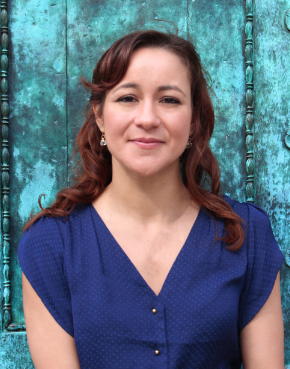 Soumeya Bendimerad of the Susan Golomb Literary Agency
Soumeya Bendimerad of the Susan Golomb Literary Agency
About Soumeya: Soumeya Bendimerad joined the Susan Golomb Literary Agency in 2012, where she is an agent and the director of foreign rights. Prior to that, she was a literary scout at Sanford Greenburger Associates and an associate editor at MacAdam/Cage Publishing. She is from the San Francisco Bay Area.
What she is looking for: She is actively seeking to represent literary fiction, upmarket/book club fiction, and select young-adult and middle grade. She is drawn to intelligent literary fiction with a fresh voice, coming of age stories, novels with elements of travel or stories set in other countries, family sagas, experiments with form, and complex but sympathetic characters. In non-fiction, she is seeking topics in popular culture, music and art history, unconventional business, politics, narrative non-fiction, sociology, cooking, travel, and memoir.
How to submit: Queries can be sent to soumeya [at] sgolombagency.com Please include a query letter with bio, publication history, and synopsis, and the first three chapters or fifty pages. Only electronic submissions accepted. Please include the word “Query” in the subject of your email.
As always, check online for interviews with these agents, as well as feedback by writers.
____________________
 Mark Gottlieb of Trident Media Group
Mark Gottlieb of Trident Media GroupAbout Mark: From an early age, Mark showed a passionate interest in his father’s work, his founding of Trident with Dan Strone, and the growth of the company. This focus on publishing continued at Emerson College, where Mark was a founding member of the Publishing Club, subsequently overseeing its first publication under the Wilde Press imprint. After graduating Emerson with a degree in writing, literature and publishing, Mark began his career as an assistant to the Vice President of the Berkley imprint at Penguin, working with leading editors at the firm.
Mark’s first position at Trident was in the foreign rights department, assisting the department’s agents in selling the books of clients around the world. Mark next became audio rights agent. Since Mark has managed the audio rights business, the annual sales volume has doubled. Now while continuing to head up audio rights, Mark is building his own client list of writers. "I am excited to work directly with authors that I bring to Trident, helping to manage and grow their careers with all of the unique resources that are available to me at Trident."
What he is looking for: In fiction, he is looking for Science Fiction, Fantasy, Young Adult, Comics, Graphic novels, Historical, History, Horror, Literary, Middle Grade, Mystery, Thrillers and New adult.
In nonfiction, he is looking for Arts, Cinema, Photography, Biography, Memoir, Self-help, Sports, Travel, World cultures, True crime, Mind/Body/Spirit, Narrative Nonfiction, Politics, Current affairs, Pop culture, Entertainment, Relationships, Family, Science, Technology.
How to submit: Use the online submission form here. Make sure you direct your inquiry to Mark.
 Soumeya Bendimerad of the Susan Golomb Literary Agency
Soumeya Bendimerad of the Susan Golomb Literary AgencyAbout Soumeya: Soumeya Bendimerad joined the Susan Golomb Literary Agency in 2012, where she is an agent and the director of foreign rights. Prior to that, she was a literary scout at Sanford Greenburger Associates and an associate editor at MacAdam/Cage Publishing. She is from the San Francisco Bay Area.
What she is looking for: She is actively seeking to represent literary fiction, upmarket/book club fiction, and select young-adult and middle grade. She is drawn to intelligent literary fiction with a fresh voice, coming of age stories, novels with elements of travel or stories set in other countries, family sagas, experiments with form, and complex but sympathetic characters. In non-fiction, she is seeking topics in popular culture, music and art history, unconventional business, politics, narrative non-fiction, sociology, cooking, travel, and memoir.
How to submit: Queries can be sent to soumeya [at] sgolombagency.com Please include a query letter with bio, publication history, and synopsis, and the first three chapters or fifty pages. Only electronic submissions accepted. Please include the word “Query” in the subject of your email.
Published on September 04, 2014 08:24
September 2, 2014
22 Cookbook Publishers Accepting Unagented Manuscripts
 Who doesn't enjoy devouring a good cookbook? Especially one that flaunts mouth-watering photos, and waxes philosophical about the complex relationship between salt, sugar and leavening, explores the physics of meringue, or - and this is a clincher - chronicles how a disaster becomes the perfect method of baking brownies. (Turn off the oven before they are done, then rebake later!)
Who doesn't enjoy devouring a good cookbook? Especially one that flaunts mouth-watering photos, and waxes philosophical about the complex relationship between salt, sugar and leavening, explores the physics of meringue, or - and this is a clincher - chronicles how a disaster becomes the perfect method of baking brownies. (Turn off the oven before they are done, then rebake later!) And, honestly, who isn't stirred by a pie chart!
Here are 22 cookbook publishers welcoming proposals from authors - no agent needed! (Remember, non-fiction publishers want proposals, not manuscripts.) Make sure to read the full submission guidelines before you submit.
Now get cookin'!
_______________________________
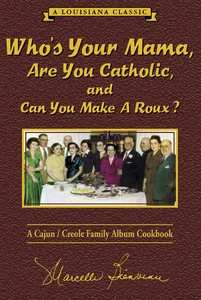 Acadian House began in 1979 as a regional book publisher specializing primarily in Louisiana-related titles, with particular emphasis on the state’s history, food and culture.
Acadian House began in 1979 as a regional book publisher specializing primarily in Louisiana-related titles, with particular emphasis on the state’s history, food and culture. Submissions: Send query letter summarizing the content of your book. The letter should also provide biographical data on you as an author, including educational background, experience in writing, qualifications to write the manuscript you hope to submit, and other information that establishes a connection between you and the subject of the manuscript. A description of the audience for the book is also welcome in this letter. You will be contacted if the editor is interested. Snail mail only. Read full guidelines here.
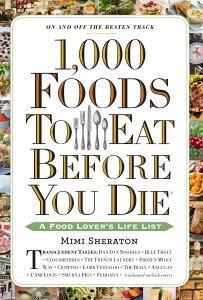 Artisan Books is an imprint of Workman Publishing Company. Founded in 1968, Workman is an independent publisher of adult and juvenile trade books.
Artisan Books is an imprint of Workman Publishing Company. Founded in 1968, Workman is an independent publisher of adult and juvenile trade books.Submissions: Please send a proposal including: a cover letter giving a short description of the project and what materials are included in the package, a proposal, which includes an outline, introduction, art list, and sample text/chapters, sample illustrations or photographs (duplicates, not originals), a market analysis of the potential readership for your book, including a comparison to similar books, author biography and credentials, a self-addressed, stamped envelope for the return of materials. Snail mail only. Read full guidelines here.
 Burford Books is an independent book publisher based in Ithaca, NY. Their specialty is books on the outdoors, with titles on everything from golf to sailing. Their list includes military history, food and wine, gardening and outdoor living, adventure travel, and other topics. Worldwide distribution.
Burford Books is an independent book publisher based in Ithaca, NY. Their specialty is books on the outdoors, with titles on everything from golf to sailing. Their list includes military history, food and wine, gardening and outdoor living, adventure travel, and other topics. Worldwide distribution.Submissions: Send a query letter to info@burfordbooks.com, with the word “Query” in the subject line. In this email please briefly describe the book you have written or are planning to write, and give us an idea of who you are and why you feel you are qualified to write this book. Read full guidelines here.
 Camino Books specializes in non-fiction books with a focus on the Middle Atlantic states. They currently publish about 6 to 10 books per year, and are always looking for new material and projects.
Camino Books specializes in non-fiction books with a focus on the Middle Atlantic states. They currently publish about 6 to 10 books per year, and are always looking for new material and projects.Submissions: Your proposal should include: a description of the subject of your book, as well as its format and length, an outline of the book or a sample table of contents, a sample chapter or two, your qualifications, the audience you hope to reach, your ideas for publicity and promotion. Please include SASE. Snail mail only. Read full guidelines here.
 Chronicle Books "We're always looking for the new and unusual." Chronicle Books publishes 90 titles per year.
Chronicle Books "We're always looking for the new and unusual." Chronicle Books publishes 90 titles per year.Submissions: Your proposal should include: a one-page cover letter giving a brief description of the project, why you think Chronicle should publish it, what's included in the package, and your contact information, a market analysis, SASE. Electronic submissions preferred. Read full guidelines here.
 Countryman Press became a division of W.W. Norton & Company, Inc. in 1996. They publish about 70 books per year and currently have more than 350 books in print.
Countryman Press became a division of W.W. Norton & Company, Inc. in 1996. They publish about 70 books per year and currently have more than 350 books in print.Submissions: Please send a cover letter with the working title, the estimated length, and a brief description of the book, list of chapter contents or a detailed outline, brief overview of the market for your book and its existing competition (which may take some thorough research on your part), your qualifications as author, including information on any previously published books, articles, or other materials, or relevant professional experience, two or three sample chapters, and an introduction if applicable; no full manuscripts, please. Snail mail only. Read full guidelines here.
 Fair Winds Press publishes instructional books in a range of categories, including lifestyle, cooking, health and body, self-help, spirituality, and history. It is owned by the Quarto Publishing Group.
Fair Winds Press publishes instructional books in a range of categories, including lifestyle, cooking, health and body, self-help, spirituality, and history. It is owned by the Quarto Publishing Group.Submissions: Book queries are usually around five pages and must include: a paragraph introducing yourself, a paragraph offering an overview of the proposed idea/concept, a book outline or table of contents, your ideas for the type of visual materials to accompany the text, and marketability information. Snail mail only. Read full guidelines here.
 Gibbs Smith is a Utah-based publishing house focusing on social studies textbooks and digital materials for schools, special interest publishing, and cookbooks. They are a mid-sized house, publishing 60 new books a year.
Gibbs Smith is a Utah-based publishing house focusing on social studies textbooks and digital materials for schools, special interest publishing, and cookbooks. They are a mid-sized house, publishing 60 new books a year.Submissions: Please send a proposal, including: a description of the subject; an analysis of the market and the author’s qualifications for writing the book as well as how the author is going to help sell and promote the book, including on‐line presence and outreach; an outline of contents; and sample writing. If photographs or illustrations are a major component, attach a PDF or jpegs showing samples. Maximum size of attachments is 3 MB. We will invite the complete submission only if we are interested. Electronic submissions only. Read full guidelines here.
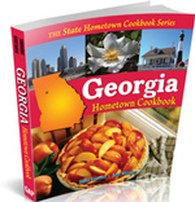 Great American Publishers is a traditional small press with an emphasis on regional cooking (any state).
Great American Publishers is a traditional small press with an emphasis on regional cooking (any state).Submissions: Include a cover letter with a brief description of the project. Who is the target audience of your book? Are there similar publications already available? How is your book different from other titles on the market? What sort of promotion will be particularly effective for you and your book? How can you participate in the sales and marketing of your book? Snail mail only. Read full guidelines here.
 The Harvard Common Press is an independent publisher of quality trade books specializing in cookbooks and parenting/childcare books.
The Harvard Common Press is an independent publisher of quality trade books specializing in cookbooks and parenting/childcare books.Submissions: Authors interested in publishing with The Harvard Common Press are encouraged to submit a full proposal, including: a chapter-by-chapter outline of the proposed book, an introduction and a sample chapter (for cookbooks, please include a recipe list), a résumé or brief personal history, any current or planned marketing and sales platforms you may have, an evaluation of competitive titles and how they relate to the proposed book. Snail mail only. Read full guidelines here.
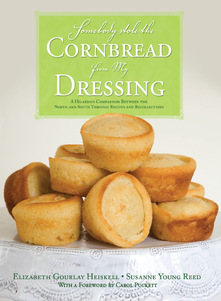 The Overmountain Press is primarily a publisher of Southern Appalachian non-fiction. In cookbooks, they are looking for new and interesting ways of cooking or organizing the recipes.
The Overmountain Press is primarily a publisher of Southern Appalachian non-fiction. In cookbooks, they are looking for new and interesting ways of cooking or organizing the recipes.Submissions: Proposals should include a hook (what's so great about your book?), your qualifications for writing this book, your ideas for marketing and promoting the book, a summary of the book in 5-8 sentences, an excerpt of your choosing. Electronic submissions preferred. Read full guidelines here.
 Pelican Publishing Company is a medium-sized company with a backlist of over 2,500 titles and fifty to sixty new titles produced yearly. As a general trade publisher, Pelican is presently the largest independent trade book publisher in the South.
Pelican Publishing Company is a medium-sized company with a backlist of over 2,500 titles and fifty to sixty new titles produced yearly. As a general trade publisher, Pelican is presently the largest independent trade book publisher in the South.Submissions: Pelican Publishing Company requires a query letter describing the project briefly and concisely (see below), a separate list of the author’s publishing credits, a printout of the outline and one or two chapters, and a self-addressed stamped envelope (SASE) sufficient for the return of the chapters or at least for our reply. If the chapters’ return is not needed, please so state in the query letter. Multiple (or “simultaneous”) or e-mailed submissions are not considered. Snail mail only. Read full guidelines here.
 Quail Ridge Press specializes in the publication of regional cookbooks. They also publish national cookbooks and regional non-fiction.
Quail Ridge Press specializes in the publication of regional cookbooks. They also publish national cookbooks and regional non-fiction.Submissions: Include a cover letter that gives a brief description of the project, an outline and/or introduction, a table of contents, and at least 30 pages of the text, if the project will include illustrations or photographs, please send samples, a market analysis of the book including the titles, publishers, and dates of all similar books, and a biography of the author, including publishing credits and credentials in the field. Snail mail only. Read full guidelines here.
 Sasquatch Books is one of the country’s leading independent publishers, known for its innovative and eclectic list of nonfiction books featuring authors such as Nancy Pearl, Lynda Barry, and Art Wolfe, and top-selling titles in food & wine, travel, and gardening.
Sasquatch Books is one of the country’s leading independent publishers, known for its innovative and eclectic list of nonfiction books featuring authors such as Nancy Pearl, Lynda Barry, and Art Wolfe, and top-selling titles in food & wine, travel, and gardening.Submissions: Send a query letter, proposal, or a complete manuscript, along with information about you as an author, by mail. Please do not send original materials of any sort. They are not responsible for misplaced items. No email queries. Snail mail only. For submission details click here and scroll down.
 Seaside Publishing is an imprint of the University Press of Florida. It has a regional focus.
Seaside Publishing is an imprint of the University Press of Florida. It has a regional focus.Submissions: To submit a manuscript, please send a one-page letter of inquiry to Interim Editor-in-Chief, Meredith Morris Babb, to determine the University Press of Florida's interest in your project. Please include your full postal address. If they are interested, they will contact you for more information. Email query. Read instructions here.
 Sourcebooks, Inc. is an independent publisher located in Naperville, Illinois. The company publishes books, ebooks, and digital products in most consumer categories, including college guides, memoir, children's books, young adult, fiction, romance, and reference books. Sourcebooks publishes over 300 titles a year and boasts many bestsellers.
Sourcebooks, Inc. is an independent publisher located in Naperville, Illinois. The company publishes books, ebooks, and digital products in most consumer categories, including college guides, memoir, children's books, young adult, fiction, romance, and reference books. Sourcebooks publishes over 300 titles a year and boasts many bestsellers.Submissions: Please send a proposal with a brief synopsis in 1-2 paragraphs, author bio or resume specifying credentials and publication credits, if any, a complete table of contents, plus estimated length of manuscript in words and pages, two to three sample chapters (not the first), a description of the target audience, one page/paragraph on your book's unique advantages, a list of competing or comparable titles and how your book differs. Electronic submissions only. Read full guidelines here.
 Square One specializes in books on cooking, parenting, business/personal finance, self-help, history, and memoir among others. Square One has been named one of the top ten fastest-growing indie book publishers in North America by Publishers Weekly for six years in a row.
Square One specializes in books on cooking, parenting, business/personal finance, self-help, history, and memoir among others. Square One has been named one of the top ten fastest-growing indie book publishers in North America by Publishers Weekly for six years in a row.Submissions: When submitting your manuscript proposal, please include the following items: a cover letter explaining the concept of your book, why you wrote it, and its intended audience, a detailed table of contents, a brief overview of the book, biographical information about you and any coauthors or illustrators, a self-addressed stamped envelope (SASE). Snail mail only. Read full guidelines here.
 Sterling Publishing covers a broad range of subject areas including: current events, diet and health, parenting, popular culture, reference, history, art and artists, music, a broad selection of cookbooks, fiction, children's books, and more. Sterling is a large house, with over 5,000 titles in print.
Sterling Publishing covers a broad range of subject areas including: current events, diet and health, parenting, popular culture, reference, history, art and artists, music, a broad selection of cookbooks, fiction, children's books, and more. Sterling is a large house, with over 5,000 titles in print.Submissions: Please write a cover letter explaining your idea and enclose an outline and a sample chapter of the proposed book (typed and double-spaced, please) along with sample illustrations where applicable. Snail mail only. Read full guidelines here.
 Surrey Books is focused on food, nutrition, and entertaining. It was acquired by Agate in 2006. In addition to conventional cookbooks, Surrey also publishes specialized cookbooks focusing on gluten-free, vegan, and diabetes cooking.
Surrey Books is focused on food, nutrition, and entertaining. It was acquired by Agate in 2006. In addition to conventional cookbooks, Surrey also publishes specialized cookbooks focusing on gluten-free, vegan, and diabetes cooking.Submissions: Agate is considering submissions in the general areas of food, cooking, and nutrition-related nonfiction, for its Surrey imprint. Email query. (Do not send full proposal.) Read instructions here.
 Tuttle specializes in Asian cultures. They currently have a backlist of over 6,000 titles and publish 150 new titles per year. Tuttle is a part of the Periplus publishing family.
Tuttle specializes in Asian cultures. They currently have a backlist of over 6,000 titles and publish 150 new titles per year. Tuttle is a part of the Periplus publishing family.Submissions: Unlike most large publishing houses, Tuttle offers a hands-on approach, working closely with individual authors. Please submit a complete proposal by email or snail mail. Electronic submissions are preferred. Please note that Tuttle publishes Asian cuisine cookbooks. Read full guidelines here.
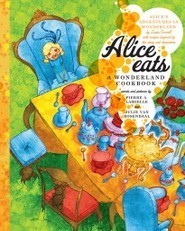 Whitecap Books is a Canadian book publisher. Their list features visually appealing books on food, wine, health and well-being, regional history, and regional guidebooks.
Whitecap Books is a Canadian book publisher. Their list features visually appealing books on food, wine, health and well-being, regional history, and regional guidebooks.Submissions: Please send a cover letter, and a full proposal along with a complete list of recipes, accompanied by 15 sample recipes. Do not send original artwork. Snail mail only. Read full guidelines here.
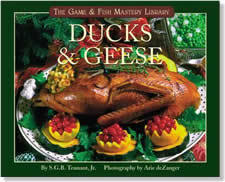 Willow Creek Press is a publisher specializing in nature, outdoor and sporting topics, gardening, wildlife and animal books, and cookbooks.
Willow Creek Press is a publisher specializing in nature, outdoor and sporting topics, gardening, wildlife and animal books, and cookbooks.Submissions: Send a cover letter detailing the work as a whole. Include who your target audience is and provide a rationale for why Willow Creek Press is the best publisher for your work. Also include: a chapter-by-chapter outline of the entire work, one or two sample chapters, a brief bio or a note describing who you are and why you are the right person to write this book, a self-addressed, stamped envelope with sufficient postage for the return of all of your material. If you do not need your materials returned, please include an envelope with first-class letter postage for their reply. Snail mail only. Read full guidelines here.
Published on September 02, 2014 08:21
August 29, 2014
Round 10 of the Amazon vs Everybody Wars: Amazon vs Japan
 In this week's round of the Amazon vs Everybody Wars, Amazon is taking on Japan.
In this week's round of the Amazon vs Everybody Wars, Amazon is taking on Japan.Amazon is exploiting its position as Japan's largest book retailer by ranking publishers according to how much they pay Amazon. The publishers with the highest ranking are given top billing on the Amazon Japan website.
Publishers are calling it "blackmail."
Amazon is calling it "business as usual."
The manipulation of Amazon Japan is just one more in a long string of extortionist tactics that include removing pre-orders from books published by "uncooperative" publishing companies (Hachette and Macmillan), and removing new video titles from Disney and Time Warner. So far this year, Amazon has incurred the wrath of the FTC, the Author's Guild, Germany, and France as well as thousands of authors.
But in spite of being dissed by the German Minister of Culture, Amazon continues to expand. It has gobbled up Goodreads, where it immediately began deleting reviews it found unfavorable, and purchased Twitch, the video-game livestreaming site (where it will no doubt employ the same tactics). Meanwhile Amazon has cut royalty rates on audiobooks, leaving many self-publishers in the lurch.
And the year ain't over yet.
________________________
Book publishers shout foul over Amazon Japan's new ratings
Asahi Shimbun, August 28, 2014
By Mayumi Mori/ Staff Writer
Online retail giant Amazon Japan introduced a new system this summer to rank book publishers, a decision that has not gone down well with its business partners.
Amazon Japan is the nation's largest book retailer for paper and electronic media. Its new system gives higher rankings to publishers that pay higher fees to Amazon Japan and to publishers with larger eBook catalogs.
Additionally, eBooks from publishers ranked higher are given more prominence on the Amazon.co.jp website.
Many publishers, including high-profile publishing houses, have protested the move, calling it a form of "blackmail" that exploits the company's considerable dominance in the book retailing industry.
"Wouldn't antitrust authorities start to wonder if Amazon Japan is taking advantage of its monopolistic position in the market?" said Bungeishunju Ltd. when it protested to Amazon Japan in June.
Japanese publishers are continuing to hold talks with Amazon Japan.
Disagreements between parent company, Amazon.com Inc., and publishers are intensifying worldwide.
In the United States, 900 renowned authors protested against Amazon for putting pressure on publishers that resisted the company's demands to lower eBook prices by delaying the shipping of their books.
Media analyst Satoshi Osawa said if publishers start to only focus on dealing with the retailing giant, "it could lead to lower quality of their products."
An official with Amazon Japan's public relations department said, "It's difficult to comment because the issue deals with individual contracts."
Published on August 29, 2014 11:16
August 27, 2014
How to Research an Agent
 The best way to find an agent is to either marry one, or go to conferences. There is no substitute for face-to-face communication.
The best way to find an agent is to either marry one, or go to conferences. There is no substitute for face-to-face communication.Unfortunately, most writers can't make it to conferences. So, they are left with the task of writing query letters. (Even if you do find an agent at a conference, you are not off the hook. You still have to write a query.)
Whether you meet an agent in person, or look one up online, you have to do your research. Does the agent represent your genre? Is he/she they willing to take on new clients? Does she/he have a good track record for sales? Which publishers has the agent worked with? How does he/she treat clients?
All of these questions are important, and all can be answered by researching agents online. These are the steps to take for researching an agent.
1) Go to AgentQuery. Not all agents on agentquery are members of the AAR, but all are established. You can search on an agent's name, or you can search by genre. If you search by genre, make sure you do a full search and filter for agents who are actively seeking clients. As you find agents who are taking on clients in your genre, make a list. This site has lots of great resources, including a list of twitter handles for agents, how to write a query letter, and lists of publishers and literary magazines, to name a few.
2) Go to the agent's or agency's website. (You can do this directly from agentquery.) Is the agent still taking clients? (Sometimes, agentquery is not up to date.) Does the agent still represent your genre? How does the agent sound? Does he or she appear helpful. and supportive? Does the agent charge a "reading fee"? (If so, cross the agent off your list. No reputable agent will charge a fee for reading a manuscript. No reputable agent will use a submission as an excuse to offer "editing" services either.) Very few agents post their contract on their websites, but when they do, read those contracts carefully. Literary agents, unlike talent agents, do not represent you, they represent your book. (Only one.) Contracts that demand representation rights for all your work, or for prequels or sequels, should be avoided.
3) Google the agent. Look for "querytracker," and "absolute write" entries. Both of these will give you insights as to turnaround time, and whether authors have had positive (or negative) experiences. You can also go straight to querytracker and look the agent up directly, and you can go to absolute write forums. (I find it easier to do a google search.) If there are interviews posted online, read them. Interviews are a great way to discover what the agent does and does not like in a query letter, which genres he or she is particularly interested in, and other useful details.
4) Look the agent up on Preditors and Editors. The Pred and Ed website has an extensive list of agents and publishers. If misconduct has been reported, they flag the agent as "not recommended." They also flag the agent if he or she is recommended, and if there have been recent sales. This is a great website, with a lot of resources, so while you are there, feel free to look around.
5) Google "agent [agent's name]". When authors publish a book, they almost always thank their agent in the "acknowledgements" section. Often you will find something like this: "I want to thank my agent, [name of agent] for her tireless support and encouragement." If the book has been listed on google books, this search will find all such acknowledgements. This is a good way to see how many books the agent has represented, which is particularly useful if the agent does not include a list on his or her website.
Once you have assembled a list of agents that meet all your requirements, it's time to send queries.
Published on August 27, 2014 08:06
August 22, 2014
Round 9 of the Amazon vs Everybody Wars: Amazon vs Authors
 In the latest round of the Amazon vs Everybody Wars, 900 American authors posted a letter in the NYT asking people to write to Jeff Bezos about his hardball tactics. More than 1000 German, Austrian and Swiss authors have done the same, accusing Amazon of manipulating its recommended reading lists and lying to customers about the availability of books as retaliation in its dispute with the Bonnier Group. To add clout to the protest, the German Minister of Culture, Monika Gruetters, has openly endorsed the letter.
In the latest round of the Amazon vs Everybody Wars, 900 American authors posted a letter in the NYT asking people to write to Jeff Bezos about his hardball tactics. More than 1000 German, Austrian and Swiss authors have done the same, accusing Amazon of manipulating its recommended reading lists and lying to customers about the availability of books as retaliation in its dispute with the Bonnier Group. To add clout to the protest, the German Minister of Culture, Monika Gruetters, has openly endorsed the letter.So where does this dispute leave authors who are just trying to get their novels onto a platform where it might have a chance of getting noticed?
The hard truth is that big publishers have let down authors. As an unpublished author, you have to jump through hoops to get an agent, and, when you do, the agent sometimes spends years attempting to sell your book. When your book finally does sell, the contract leaves you with next to nothing in royalties. The publisher does very little to market your book, so sales are poor. Then, you can't get your second book published because the first one was not successful.
That is why so many of us have turned to Amazon. At least we can publish on a platform that is well-trafficked. And we appreciate the opportunity. But, Amazon's battles with the large publishing houses have nothing to do with giving opportunities to writers, or with defending our interests.
Amazon's claim that it is forcing publishers to lower prices to make books more accessible is disingenuous at best. Amazon, unlike publishing houses, does not have to pay editors and proofreaders. It does not have to pay taxes on its stock. Nor does it have to shell out advances to authors, or pay for brick-and-mortar shelf space. And it gets the same deal on wholesale orders from publishing houses as every other retailer, but without the overhead, so its profits are higher. Still, Amazon isn't satisfied.
Amazon won't be content until it holds all the cards in the deck. That is why it is attempting to drive down prices. Book stores are already dropping like flies, unable to compete with Amazon's prices. And once Amazon has finished off the publishers, we're done.
______________________________________________
Amazon vs Hachette: It’s Getting Nasty
By Jim Milliot, Publishers Weekly, Aug 15, 2014
The two-page ad that ran in the Aug. 10 issue of the New York Times, which more than 900 authors signed calling for readers to email Amazon CEO Jeff Bezos to air their displeasure at the company’s tactics in its terms dispute with Hachette Book Group, unleashed some of the harshest language yet in the months-long standoff.
Any pretense that this was a typical publisher-bookseller negotiation, as the parties said when news of the dispute first broke, has given way to statements by the Amazon Books Team in a blog post on Aug. 8 on the readersunited.com site that pointed to HBG’s role in colluding with other publishers to raise e-book prices. (The publishers’ switch to the agency model had the effect of setting prices for Amazon and all other retailers on many new titles at $14.99, well above Amazon’s preferred price of $9.99.) The Amazon post urged readers to email HBG CEO Michael Pietsch and ask him why the publisher was against lower e-book prices. Pietsch responded to the email campaign by noting that HBG sets its own prices, and saved his sharpest criticism for Amazon’s stance in the negotiations, writing that Amazon initiated the fight because it “is seeking a lot more profit and even more market share, at the expense of authors, bricks and mortar bookstores, and ourselves.”
“Once again,” Pietsch continued, “we call on Amazon to withdraw the sanctions against Hachette’s authors that they have unilaterally imposed, and restore their books to normal levels of availability. We are negotiating in good faith. These punitive actions are not necessary, nor what we would expect from a trusted business partner.”
For its part, the Amazon Books Team said it “will never give up its fight for reasonable e-book prices,” and said that it is HBG that has prevented a deal from getting done. According to Amazon, “Hachette spent three months stonewalling and only grudgingly began to even acknowledge our concerns when we took action to reduce sales of their titles in our store.” The company added that it is HBG that has rebuffed three attempts by Amazon to remove authors from getting caught in the crossfire.
The public fight over terms has caused a deep division between authors: those who believe the Amazon argument that lower e-book prices result in higher unit sales and thus more money for everyone, and others who support the HBG position that its ultimate goal in its discussions with Amazon is to preserve a bookselling environment that includes not just Amazon but a range of outlets including bricks-and-mortar bookstores.
Peter Hildick-Smith, president of the book research firm Codex Group, said that, given current market trends, the importance of the dispute between Amazon and HBG “goes well beyond a simple negotiation over selling terms.”
Based on Codex survey data, Amazon has more than tripled its book unit share, from 13% in 2008 to 40% in 2014, which has contributed to an estimated 30% loss of physical bookstore selling space over the same period. With that loss of bookselling space has come a 4% decline in U.S. households reading fiction from 2008 to 2012, according to research by the National Endowment for the Arts.
In Hildick-Smith’s view, just as Hollywood movie studios would be reduced to mere video producers without movie theaters to launch their latest blockbusters, trade publishers without physical bookstores to accelerate new book discovery would be robbed of their unique ability to make break-out bestsellers and author brands, and ultimately be reduced to the role of Amazon associates, reliant on daily deals to promote new titles.
Whether openly acknowledged or not, the book market is “now in a battle for both the survival of physical-world book selling and the trade publishing business model that depends on it,” Hildick-Smith said. “The choice is either to emulate the film industry, with its theaters and strong multiple channels of distribution, or else by default, go the way of the music industry, which has endured a massive revenue decline since it became dominated by digital distribution.”
Published on August 22, 2014 08:28
August 18, 2014
When Not to Contact an Agent: What Writers Should Do During the Dead Month
 August is affectionately known as the "dead month" in the publishing industry. During August all work comes to a virtual halt as editors, agents, proofreaders, typesetters, CEOs, dog walkers and everyone else on the planet takes a much-needed vacation.
August is affectionately known as the "dead month" in the publishing industry. During August all work comes to a virtual halt as editors, agents, proofreaders, typesetters, CEOs, dog walkers and everyone else on the planet takes a much-needed vacation.So, all you aspiring authors, don't submit your manuscript to publishers, and don't send your queries to agents in the month of August. (To be fair, mid-November to mid-January is also a bad time, but for different reasons.)
If your manuscript is ready to go, you have several choices of what to do during the dead month. You can write your next novel
... or
You can do research!
August is the ideal time to gather publishing ammunition. This is how to do it:
1) Make a list of agents . To assemble your list of ideal agents, go to agentquery.com and do a search on your genre (i.e. the genre of the book you want to sell). Make a list of all agents who are accepting queries in that genre. Then, once your list is assembled, go to each and every agency's website to make sure the information you have garnered from agentquery is current. While you are there, read the website, and study the bios of the agents. Do you think the agent will be a good fit for you? If not, take the agent off your list. Next type the agent's name into a google search. Look for entries from "absolutewrite watercooler" and from "querytracker." Read what other writers say about these agents. If writers report bad treatment, then cross the agent off your list. (None of the agents on agentquery will charge a fee, but some who don't may recommend editing services for which they receive a kickback. Don't query an agent who also offers editing services.) Also check preditors&editors for complaints. It will take you at least a month to assemble your list, so have fun.
2) Make a list of reviewers . The time to contact reviewers is three to four months in advance of publication. So, if you have finished your manuscript and plan to self-publish as soon as the last word is written, STOP. Don't publish until you have reviewers lined up, and all your publicity in place. (Interviews, ads, etc.) Go to List of Online Reviewers Who Accept Self-Published Books for a list of 170 book bloggers who review self-published books. Also go to Top 12 Sites for Finding Reviewers for links to several hundred more reviewers and review sites. Cull through these for reviewers who write reviews for your genre. Make a very long list. (You will need several hundred. Returns on review requests are modest.) Be sure to include their email address, or other contact information on your list.
3) If you have written short stories or poems, make a list of literary journals . Trust me, even those few journal editors who say they accept submissions all year round don't read in August. The best way to submit to literary journals is to have a list of 20 or 30 at the ready. If you are going for fame, then start your list with the journals that don't accept simultaneous submissions. If you simply want to get some writing credits under your belt, then make a list of those that do accept simultaneous submissions - and submit to all of them at once. In September. Go here to find short story markets: Top 5 Online Resources for Short Story Markets. Go here for poetry: Top 5 Resources for Publishing Poetry
4) Write templates of query letters and review requests . All letters, whether they are to an agent or a reviewer, need to be individualized. Always include the name of the agent or reviewer in your salutation, say how or where you found them, and tailor your initial pitch to that person's stated interests. That being said, there are some things that will not change from one submission to the next. Your blurb (for reviewers) or pitch (for agents) will be the same, as will your word count, genre, bio and other pertinent information. It is a lot easier to write a template query or review request and tweak it than to compose a new email for each submission. Once you are happy with your template, copy it and paste it into an email. Don't send. Just save it as a draft. Having a draft online will save a lot of time later.
Note : Writer's Digest has a great series on successful queries, which is one of the best resources you will find on how to write a winning query letter.
5) Make a submission packet . If you are submitting directly to publishers, you will need a submission packet. A submission packet typically includes a synopsis of your book, a bio, and a pitch (one paragraph), as well as sample chapters, and log lines, depending on the publisher. It also may include a proposal and a marketing plan if you are publishing a nonfiction book. If you don't know how to write a pitch, or a proposal, or a log line, or a query - now is the time to do some studying. Believe me - and I say this from bitter experience - you don't want to find out what these things are after you have begun contacting agents, publishers, or editors. There is a lot of information online about how to write all of the components of a submission packet. In fact, some agents and publishers are even kind enough to spell out what is involved on their websites.
6) Last, but not least - don't read your manuscript. I am aware that everybody under the sun will tell you to read your manuscript once again to check for typos, logic errors, and awkward syntax that you swear you did not write. (The syntax gremlins did it.) But, if you read your manuscript too many times in succession you will develop manuscript blindness.
Have you ever noticed that when you look at a word too many times, the spelling no longer makes sense? That is exactly what happens when you read your manuscript too often, especially if you read it from beginning to end. After several readings you can't see your mistakes. If you really must read your book - yet again - make spot checks. Simply scroll down to a random spot on your manuscript and read whatever paragraph your cursor lands on. I will guarantee you that nine times out of ten you will find something that needs fixing.
So, while your future agent/publisher/editor/reviewers are on a beach enjoying themselves during the month of August, you will be hard at work, proving to them that you are worth their time and attention.
Published on August 18, 2014 08:25



